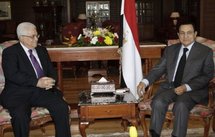
Palestinian president Mahmud Abbas with Egyptian President Hosni Mubarak.
Negotiations must "adhere to Arab principles defined by the Arab peace initiative," he said.
The initiative calls for a normalisation of relations between Arabs and Israel in exchange for a full withdrawal by Israel from Arab land, the creation of a Palestinian state and an "equitable" solution for Palestinian refugees.
"What has prevented president Abbas from pursuing negotiations is the continued policy of settlements," Abdullah said, adding that any negotiations must be during Israeli Prime Minister Benjamin Netanyahu's term in office.
Abbas, who met earlier with Egyptian President Hosni Mubarak, had said the Palestinians would base their decision on the resumption of talks with Israel based on the meeting's outcome.
"We, the Palestinian side, will abide by what is decided at this meeting," Abbas said before talks with the 15 members of the Arab Follow-Up Committee for Peace, in statements carried by the official MENA news agency.
The committee is composed of representatives from Algeria, Bahrain, Egypt, Jordan, Lebanon, Morocco, Oman, Qatar, Saudi Arabia, Sudan, Syria, Tunisia, the United Arab Emirates, Yemen and the Palestinian Authority.
Syrian Foreign Minister Walid Muallem was notably absent from Tuesday's meeting, with Damascus represented by its ambassador to the Arab League.
Before the meeting, Palestinian spokesman Nabil Abu Rudeina called on participants to accept indirect talks with Israel.
"Israel does not want to return to the negotiating table. But it wishes to blame the Palestinian side, saying that the Palestinians do not want to enter into negotiations. So we must put a stop to this pretext and reveal Israel's true position before the international community and the American administration," Abu Rudeina said.
He said indirect negotiations would be through US envoy to the region George Mitchell, insisting that direct negotiations were not on the agenda.
"There is currently no idea to hold direct negotiations; the Palestinian and Arab positions on this matter are clear -- there must be a clear reference for negotiations and the complete halt of settlements," Abu Rudeina said.
One Arab diplomat attending the talks told AFP the draft final statement welcomed Mitchell's continued efforts for indirect talks between Israel and the Palestinians.
The final draft will also stress that "there will be no direct negotiations until there are clear points of reference for the peace process -- a halt to settlements and the clarification by the American administration of the borders of a Palestinian state."
US-led efforts to restart negotiations between Abbas's Palestinian Authority and Israel, suspended at the start of the Gaza war last year, have failed so far, with Abbas insisting on a complete halt to settlement construction.
On Friday, Israeli daily Haaretz reported that the government had given a green light for 600 new homes in a Jewish settlement in east Jerusalem.
Palestinians want as their state the West Bank and the Gaza Strip, which Israel withdrew from in 2005, with annexed east Jerusalem as its capital.
About 200,000 Jewish settlers live in east Jerusalem alongside 270,000 Palestinian residents.
-------------------------------------------------------------------------------
The initiative calls for a normalisation of relations between Arabs and Israel in exchange for a full withdrawal by Israel from Arab land, the creation of a Palestinian state and an "equitable" solution for Palestinian refugees.
"What has prevented president Abbas from pursuing negotiations is the continued policy of settlements," Abdullah said, adding that any negotiations must be during Israeli Prime Minister Benjamin Netanyahu's term in office.
Abbas, who met earlier with Egyptian President Hosni Mubarak, had said the Palestinians would base their decision on the resumption of talks with Israel based on the meeting's outcome.
"We, the Palestinian side, will abide by what is decided at this meeting," Abbas said before talks with the 15 members of the Arab Follow-Up Committee for Peace, in statements carried by the official MENA news agency.
The committee is composed of representatives from Algeria, Bahrain, Egypt, Jordan, Lebanon, Morocco, Oman, Qatar, Saudi Arabia, Sudan, Syria, Tunisia, the United Arab Emirates, Yemen and the Palestinian Authority.
Syrian Foreign Minister Walid Muallem was notably absent from Tuesday's meeting, with Damascus represented by its ambassador to the Arab League.
Before the meeting, Palestinian spokesman Nabil Abu Rudeina called on participants to accept indirect talks with Israel.
"Israel does not want to return to the negotiating table. But it wishes to blame the Palestinian side, saying that the Palestinians do not want to enter into negotiations. So we must put a stop to this pretext and reveal Israel's true position before the international community and the American administration," Abu Rudeina said.
He said indirect negotiations would be through US envoy to the region George Mitchell, insisting that direct negotiations were not on the agenda.
"There is currently no idea to hold direct negotiations; the Palestinian and Arab positions on this matter are clear -- there must be a clear reference for negotiations and the complete halt of settlements," Abu Rudeina said.
One Arab diplomat attending the talks told AFP the draft final statement welcomed Mitchell's continued efforts for indirect talks between Israel and the Palestinians.
The final draft will also stress that "there will be no direct negotiations until there are clear points of reference for the peace process -- a halt to settlements and the clarification by the American administration of the borders of a Palestinian state."
US-led efforts to restart negotiations between Abbas's Palestinian Authority and Israel, suspended at the start of the Gaza war last year, have failed so far, with Abbas insisting on a complete halt to settlement construction.
On Friday, Israeli daily Haaretz reported that the government had given a green light for 600 new homes in a Jewish settlement in east Jerusalem.
Palestinians want as their state the West Bank and the Gaza Strip, which Israel withdrew from in 2005, with annexed east Jerusalem as its capital.
About 200,000 Jewish settlers live in east Jerusalem alongside 270,000 Palestinian residents.
-------------------------------------------------------------------------------









 Home
Home Politics
Politics









